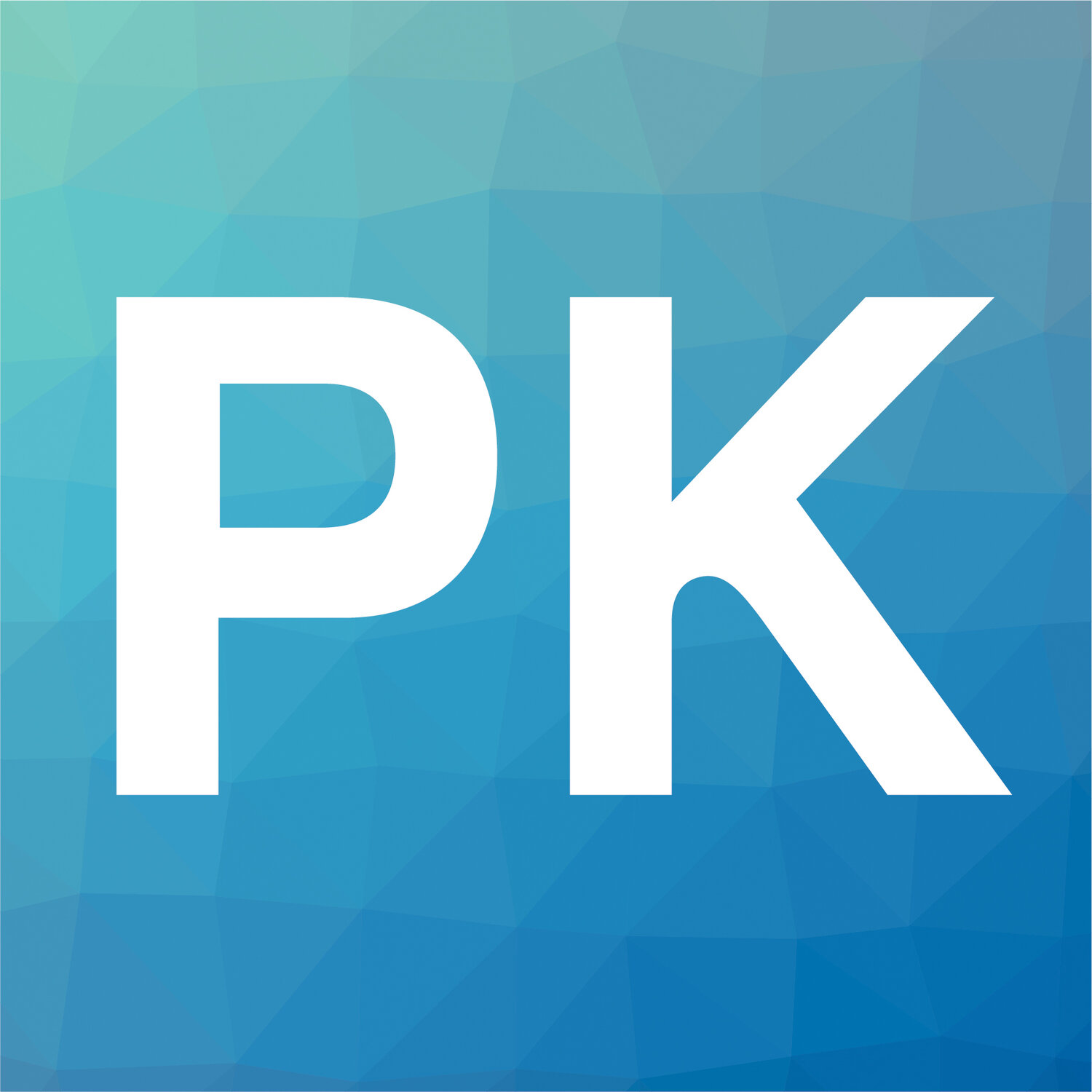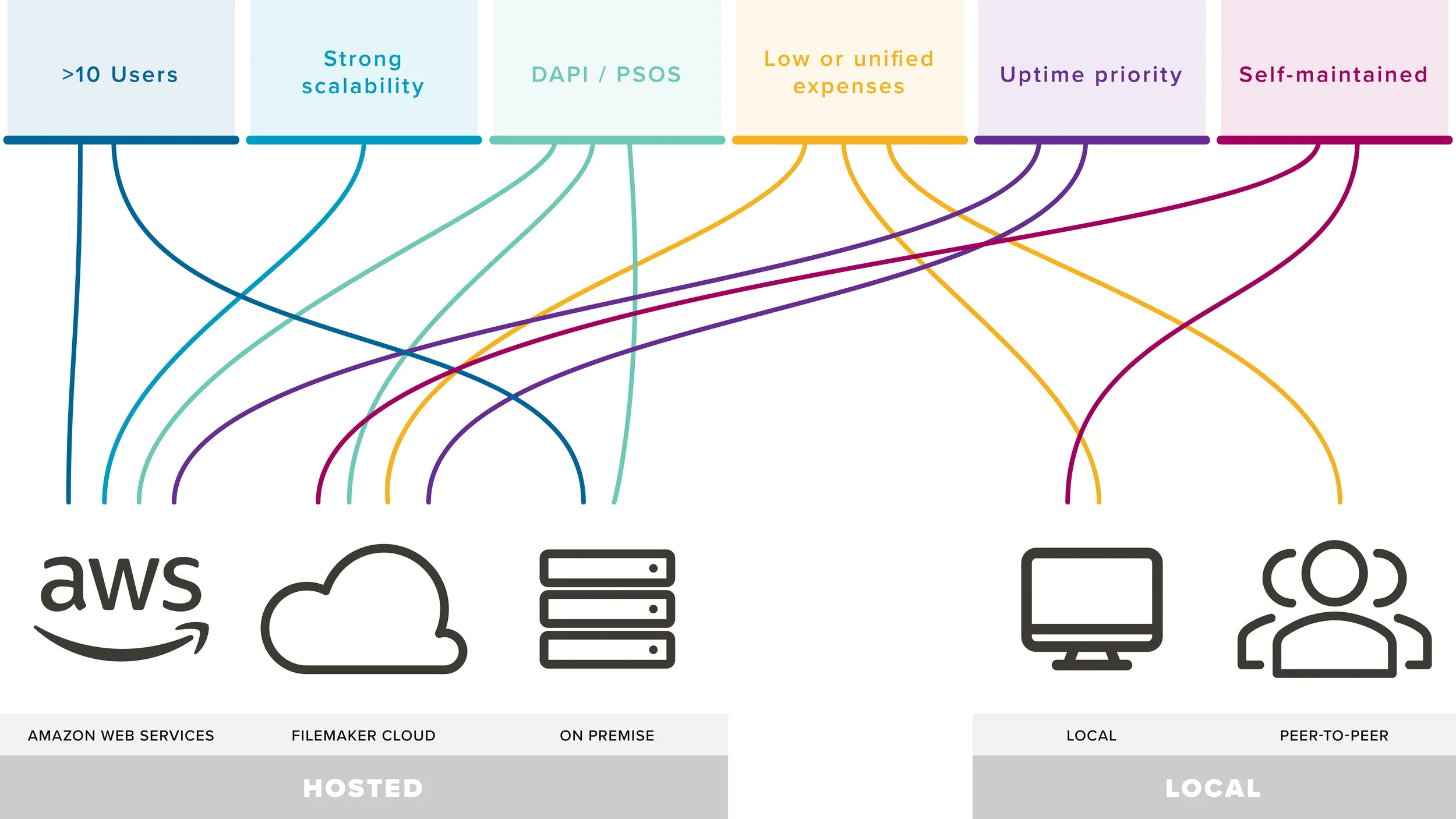FileMaker databases have five hosting options: Cloud hosting, on premise, FileMaker Cloud, local file, and peer-to-peer sharing. Of these, the three hosted solutions are cloud, on premise, and FileMaker Cloud. Each of these options has their own pros and cons that should be considered when determining where to house your database.
Cloud Hosting
At PK, we use this option for our database and use Amazon Web Services (AWS) as our host provider. Not only do we use it ourselves, but we also recommend it to all of our clients.
Pros:
Reliability. AWS guarantees 99.99% uptime, which comes out to less than four minutes of downtown per month. We’ve never personally experienced any problems with it.
Flexible security. You’re able to provide access to as many people as you’d like, or heavily restrict access down to only specific IPs.
Access to more FileMaker tools. Hosted apps have the ability to perform scripts on the server, which are faster for users, use DAPI, and access your database from your browser without needing to install FileMaker Pro via WebDirect. Furthermore, you can directly access your server machine and admin console.
Portability. Cloud tools make it easier to move your file from one cloud service to another.
Backups and redundancy. Backups are easy to create and maintain. Additionally, your data is stored in multiple places. If there is a natural disaster in one location holding your data, AWS will just use the data stored elsewhere.
Cons:
Learning curve. If you don’t have prior experience setting up servers, it’s best to generally outsource that to experts—such as us! If you decide to manage it yourself, you’ll need to monitor your server status as well as handle database backups and server restarts yourself.
Licensing. Unless you purchase a single FileMaker license for one individual, your FileMaker Pro license should include FileMaker Server. However, AWS and similar cloud-based hosting providers have a monthly fee as well. Our baseline charge for AWS hosting is $50/month.
On Premise
Having an on premise server can be either successful or a flop—and it all depends on how much you’re willing to invest in your hardware and personnel for this. We have clients that go this route with incredible success, and others that struggle.
Pros:
Super security. All your data is physically in your office. Depending on how you configure your network (external network, ethernet only, VPN, etc.) you can lock down access to your database.
One time investment. Instead of paying for monthly hosting costs, you only buy a server machine once then it is yours forever.
All the benefits of server hosting. Hosted apps have the ability to perform scripts on the server (faster for users), use the data api, and access your database from your browser without needing to install FileMaker Pro (WebDirect)
Speed. On site means you have low network latency and a very fast server (depending on how much you are willing to invest in your hardware; more on that below).
Cons:
You are responsible for your own stability. If the power goes down in your office, your server just crashed—which can lead to corruption. A successful on premise deployment includes a battery backup or backup generator for a safe shutdown process when events like this happen.
You are responsible for your own up-time. If the internet goes down in your office, you can’t go to a local cafe and still access your data. You are locked out completely until the network is back up.
Your hardware determines your performance. You can get a server machine from $800 and be frustrated on how slow it is forever. You can also pay $2000–10,000 on a fancy server machine and have a super fast super powerful database engine. The choice is yours.
You need to buy Windows licensing separately. Tack on an extra $500–5,000 charge for this. Yes, you read that price range correctly; the license recommended by FileMaker Server is on the high end of that range.
Locked in. Once you get too far down this path, it is hard to switch to Cloud hosting. For a large database, it can take a few days to a month to get all your data migrated to the cloud.
Databases and backups stored on the same machine. Vulnerable to natural disasters or theft.
FileMaker Cloud
This is the official hosting option provided from Claris for FileMaker. Worth noting, FileMaker Cloud and FileMaker Cloud for AWS are different products with the latter having an end-of-life date in January—and we’re discussing the former here.
Pros:
Pricing. Grouped flat charge for hosting and licensing, allowing you to consolidate monthly expenses. For organizations with 10 or fewer users, it can also be affordable compared to the other options (more details below for organizations with 11+ users).
All the benefits of server hosting. Hosted apps have the ability to perform scripts on the server (faster for users), use the data api, and access your database from your browser without needing to install FileMaker Pro (WebDirect)
Stability. Claris provides maintenance and monitoring so you don’t need to.
Automatic upgrades to the newest version. You will get access to the newest features as soon as they are available.
Cons:
Automatic upgrades to the newest version. You will get access to the newest bugs as soon as they are available and have limited to no power to revert to older versions.
Limited storage. You only have 2GB of storage per user (6GB per user for Standard, which costs more.)
Less control. You do not have access to the server admin dashboard and must go through FileMaker to make changes
Scaling expenses. The costs don’t scale well, resulting in a considerable jump in price once you reach 11 users. For organizations prioritizing growth, this is a major deterrent.
Difficult development. Not having direct access to your database can make the development process be harder and take longer. Additionally, there isn’t support for plugins or O-Auth.
Next week, we’ll review the two local hosted options for your FileMaker database—local file and peer-to-peer. In the meantime, we’ve created these resources to help determine potential options for your database hosting.
PK Information is a FileMaker-certified development agency serving the Tampa Bay, Miami Lakes, and Knoxville regions. We believe software should work the way you do, with business priorities first and technology second.
LEARN MORE
Would you like to learn more about hosting options for your FileMaker database? We’d love to discuss the possibilities with you!

